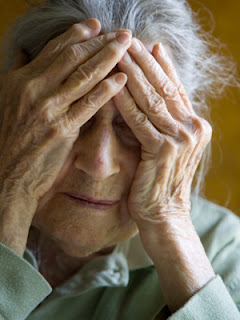Last week's post was about the causes of dementia. As promised, this week's post will discuss how to spot dementia and seek treatment for it. There is no known cure for dementia to date. But the impact of the illness can be reduced or slowed.
There are typically three stages that represent the progression of dementia.
The early stage is Mild Dementia. The patient is forgetful, and he will sometimes repeat himself, be it verbally or by actions. He may present a slightly different personality from before, and become easily tired, gets worked up over little things and dislikes socialising with people, even his family. He also finds it difficult to plan his day-to-day activities due to his mood swings and poor memory.
By this stage, you should seek medical help. Otherwise, it rapidly progresses to Moderate Dementia.
Memory loss becomes more significant. The patient would repeat words more frequently. He forgets names of common objects and familiar people. He may forget what day today is, and he forgets about recent events. He also loses awareness about familiar places and would wander around and get lost. He neglects personal hygiene, forgetting to bathe or brush his teeth. He becomes even more irritable and agitated due to his helplessness.
The final stage is Severe Dementia. He is unable to remember many things that were part and parcel of daily life, such as performing familiar tasks and language, which results in him being unable to perform basic functions like going to the bathroom, dressing and eating. He is unable to speak coherantly, and he would not be able to understand other's speech. More tragically, he fails to recognise his loved ones.
Memory loss gets even more severe. While he may still be able to remember things that happened a long time ago, as in the case of 'Ah Keng's grandfather, he will not remember recent events, and he will often misplace his things, getting extremely agitated when he can't find them. He is unaware of his current location and time. He is unable to think abstractly. His judgement becomes flawed, and he may become a danger to himself, such as crossing the road when there is an oncoming car in sight. His mood and personality would have changed drastically. He loses initiative to do anything and virtually becomes a hollow shell. Death is the ultimate outcome when he eventually wastes away.
Don't wait until it is too late! If your loved one or relative starts developing symptoms presented in mild dementia, perhaps if you realise that your memory has become increasingly unreliable and people around you are telling you that you're acting strange, it's time to seek help from the doctor.
The doctor will assess and diagnose the problem. If the problem is indeed dementia, the doctor will refer you to other doctors with specialisation in dementia to help. The patient will be given medication to slow down the illness, perhaps be instructed to attend physiotherapy sessions to regain knowledge on body functions, and advice will be given on dealing with specific behavioural problems. There is an Alzheimer's Disease Association in Singapore that you can turn to for advice and support, as well as find camarederie among other fellow care-givers. You can visit their website http://alz.org.sg/ or call their helpline 6377 0700.
Here are some things you can do to help your loved one or yourself to slow the onset of dementia.
Caregivers should constantly remind patients of the reality around them. Talk to them, remind them of the current day and date, the names of people around them. Everyday, make it a point to make him look at the family photos and point out the names of the people in it.
Maintain a regular routine. If you take the patient out for morning walks, don't suddenly switch it to an afternoon walk. He will be confused about the time and his surroundings.
Look out for strange behaviour and find out what triggers it. If the patient attempts to leave the house whenever there is a pair of shoes on the door mat, remove the shoes. On the other hand, if the strange behaviour is not dangerous, let him carry on with it. It will keep him occupied, and some dementia patients get destressed if they are forbidden to do certain things. Take the cue from how 'Ah Keng' not only does not attempt to shake his grandfather into harsh reality, but even pretends to feed imaginary chickens with him.
Elderly people who find their memories getting worst should make use of memory aids like diaries, large cardboard signs, alarm clocks, calendars etc that are easily noticeable around the house. Frequently make lists of things you have to do. Don't rely on others to be your personal organizer as this will only encourage your memory functions to go unpractised and become weaker.
If the elderly person has normal mobility, ensure that he remains physically active through walks and simple hand and leg exercises. This will prevent him from succumbing to illnesses associated with a sedentary lifestyle and ensures that he does not lose memory of his mobility functions. But do watch him lest he loses his balance or hurts himself. If his mobility functions are clearly affected, he should attend physiotherapy for dementia patients.
Dementia patients can still lead fruitful lives if your love makes up for their lack of memory. No matter how busy you are, make time for your loved ones. They may appear not to remember you, but deep down in their subconsciousness, you matter to them, and they certainly prefer you over the maid or caretaker you hired for them. Never wait until it is too late, never wait until they are too ill to remember before you show them you care.

0 comments: